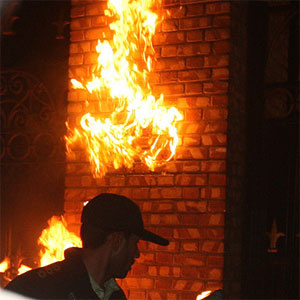An Alternative to Diplomacy
During the past two years, foreign embassies in Iran have witnessed protests, threats and attacks. What domestic and international developments have caused this?

During the past two years, foreign embassies in Iran have witnessed protests, threats and attacks. What domestic and international developments have caused this?
To answer this question, we need to have another look on Iran’s foreign policies and international relations. Attack on the British embassy, threats against Switzerland and Jordan embassies, protests in front of France, Saudi Arabia embassies and Egypt’s interest section reveal the challenges Iran has faced during the recent years, some of which have ended in diplomatic deadlocks.
Even though there were rumors of U.S. opening an interest section in Tehran, or Egypt and Iran reciprocally reopening their embassies –both fueled by low-profile visits to the united states and Egypt by Iranian officials-, predictably recurring setbacks hindered the process, hinging it on external circumstances.
Throughout the recent years, all the issues related to Iran’s foreign policy and West’s negotiations with Iran have boiled down to one point: Iran gaining power independently, relying on nuclear technology development. West’s pessimism, admonition and penalties have snowballed during the past three years and have seemingly become unstoppable.
The latest throttlehold practiced by West has been inciting neighbors and Arab countries against Iran, while providing them with adequate pretexts. Demonizing Iran even led the country to boycott Paris Summit of Afghanistan’s neighbors. Meanwhile, Iran’s critical attitude towards Baghdad-Washington security pact didn’t bring the country favorable results and its protests against the Arab Peace Plan to end Arab-Israeli conflicts ended in no discord among its advocators, depicting an uncertain future for Iran.
In fact, regional and extra-regional equations which Iran asked for their redirection or having a role in them, have turned so complicated and unexpected that Islamic Republic has lost sway in developments and long-term and medium term decisions concerning middle east. United States unswerving support for Iran’s neighbors (Afghanistan, Pakistan, Iraq, Turkey, Azerbaijan and Arab states of the Persian Gulf) is gradually rendering them independent of political and economical exchange with Iran. This is also true for the Arab Peace Plan and the possibility of a peace accord between Iran and Syria which if realized, will reduce Iran’s regional hegemony to a large extent and corner the country.
West may have predicted the future of Middle East and rise of aggressive reactions, especially Iran’s behavior after it gets distanced from active diplomacy. History of Middle East has shown that ideological concerns, nationalistic aspirations, opposition to foreign cultural influence and having a sense of inferiority against West, have sowed the ground for anarchistic behaviors, fundamentalism and national radicalism. Such trends have been frequently witnessed in Afghanistan, Pakistan, Iraq, Saudi Arabia and all other Arab countries during the recent decades, leading to rise of different sects, reinforcement of ideology rule and fundamentalism, pan-Arabism etc. Hence, West isn’t probably unaware of a similar possibility to happen for Iran.
Throughout the last decades, the Islamic Republic of Iran has followed a sinuous, yet clear, course in its international agenda. Becoming an independent, powerful and influential country in the region –as it was during its history- but based on a Shiite doctrine and political system, was about to be realized after the Imposed War [with Iraq]. However, in a short time some errors and deficiencies created obstacle against this process, making its completion hard to achieve, if not unachievable. Neighbor countries aren’t going to repeat their mistakes and allow Iran to become the regional hegemon. They would prevent this even if it means setting aside the old problems with Israel and giving way to cultural domination of the United States and West in this region.
If the current trend doesn’t stop, Iran will experience fruitless negotiations. The more Middle East becomes independent of Iran and satisfies its needs –such as energy and security- through other ways, the more limited will spheres for Iran’s diplomacy will become. At a time when leading Arab countries such as Saudi Arabia, Jordan and Egypt take the same stance on Palestine and oppose Iran’s strategy, chances for efficiency of Iran’s policy on Palestine and uniting Islamic countries to pressure Israel becomes weaker and weaker, persuading Iran to select other means.
In fact, attacking the embassies of countries which do not agree with Iran’s foreign policies and international and regional plans is an alternative to diplomacy. Such kinds of protest aren’t merely actions symbolizing public opinion, but on a higher level a reaction to the impasse in talks and inefficiency of diplomacy. By resorting to symbolic violence and protest we can make others hear us.
Embassies are diplomatic representatives of each country, bearing their opinions in the host country. Therefore, any threat against them equals to discontent with their policy, a kind of protesting dialogue. Falling into a situation where chances of active diplomacy are taken away from Iran, raise the possibility of using this means to compensate for the limitations.
Nowadays, embassies of some Arab and European countries are facing threats and protests. This can happen for more embassies if the Iranian diplomacy remains futile.

